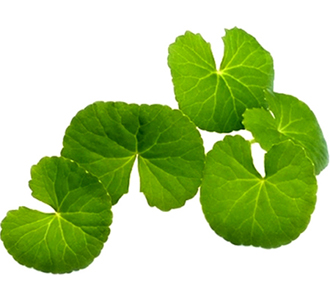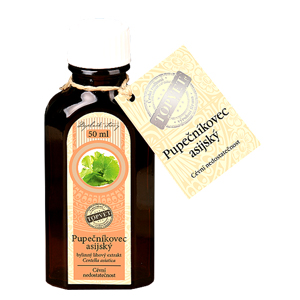No products
Centella/Asiatic pennywort/Gotu kola tincture - 50ml
(Herba Centella asiatica)
Centella/Gotukola (Centella asiatica) assists in the following diseases: rheumatism, hepatic cirrhosis, asthma, improve blood circulation, inflammation, senility, stroke, immune system, Alzheimer's disease, diabetes...
![]()
Description of herb
Centella/Asiatic pennywort/Gotu kola (Centella asiatica) climbing plant growing in hot swampy areas of India, Sri Lanka, China, Australia, South Africa and expanded throughout Southeast Asia is widely used in natural medicine and rejuvenating therapies. It encourages brain activity and is often referred to as "brain food." It is one of the traditional medicinal herbs of Asian medicine that strengthens physical and mental health and resilience, removes fatigue, and is also attributed to a significant effect on longevity.
Healing effects
The leaves are used for healing purposes, the shape of which adapts to the environment in which the herb grows - in the water you can see broad and fanny leaves, dry and small and thin.
In general, the healing effects of this plant can be divided into systemic and local. Systemic effects consist primarily in the overall strengthening of mental functions by stimulation of the central nervous system:
- increased red blood cell production in the bone marrow
- supports the supply of oxygen to the brain cells and slows down their natural aging process
- used in the treatment of mental disorders, psychological anxiety, mood disorders and overall increased fatigue
- in higher doses has sedative and calming effects
- in elderly people helps to overcome the state of frequent forgetfulness, strengthens the vitality of the organism and increases its resistance to stress
At the local level, Centella asiatica has its anti-inflammatory and antiseptic effects, which is still used mainly in the treatment of skin diseases, such as psoriasis .
Centella/Asiatic pennywort/Gotu kola has an important role in traditional Indian and Chinese medicine, but it gains more and more popularity in our latitudes. In Vietnam, decoction is used to treat senility, epilepsy and some forms of hepatitis. Indian Ayurveda recognized its positive effect on the human organism thousands of years ago, and since then Gotu kola has been an important part of it. The trachea participates in the activities of the central and peripheral nervous system as a tonic and adaptogen and belongs to the category of so called brain nutrients, because it significantly contributes to the enhancement of memory and improvement of concentration. The active ingredients are mainly triterpenes, namely asiaticosides. According to experts, they increase collagen production in bones and cartilage and help improve peripheral blood circulation. Gotu wheels, according to their information, strengthens the cells in the vascular walls, thus helping blood flow. It is for these properties that it is used as an adjunct to the overall treatment of varicose veins. Because it promotes healthy connective tissue development, it can also play a positive role in the treatment of burns, colloidal scars, ulcers and various wounds, it is also recommended for psoriasis and eczema. Interesting results, however, Achilles' Achilles achieves even in studies testing his influence on mental abilities. It is most likely to contribute to improving memory, concentration and learning abilities. Sometimes it is said that it deepens and activates the speech center, which is used in rehabilitation after a stroke and heart attack. The Indians believe that the leaves of Gotu's wheels dampen the symptoms of aging and contribute to longevity. Traditional medicine states that through the nervous system it helps to influence many biological processes - improves mental functions, slows degenerative changes in the brain and peripheral network, improves peripheral blood circulation (eliminates the development and development of varicose veins, cities and clots), accelerates the reconstruction of internal tissues and skin after illness and injury. Helps relieve headaches, help the body at increased body temperature, sleep disorders, boosts memory, reduces fatigue and depressed mood. It is suitable for healing, rheumatic pain, water retention, bruising, coughing and skin diseases. Gotu has a thousand-year reputation as a rejuvenating product, as a means to extend life and increase mental well-being, as confirmed by modern scientific research. It is the cult herb of yoga masters and other oriental arts.
Active substances
- Vitamin C and B
- Carotenoids
- Flavonoids
- Alkaloids
- Glycosides
- Sterols
- Tanin
- Carbohydrates
- Inorganic salts
- Aspartic acid
- Glycine
- Glutamine
- Alfa-alanin
- Fenylalanin
- Saturated fatty acids
Properties
Adaptogen, diuretic, tonic, anti-inflammatory, rejuvenating, anti-inflammatory, antiseptic.
Recommended at
Per oral use heals and helps with these diseases and troubles
- rheumatism
- liver cirrhosis
- Asthma
- cholesterol deposition in the blood vessels
- improve blood circulation
- against inflammation
- reduce the risk of senility
- to improve the oxygen supply to brain cells
- strengthening the immune system
- strengthening and calming nerves
- increasing mental capabilities
- improve memory and learning ability
- Alzheimer's disease
- mental disorders
- psychic restlessness
- mood disorders
- increased fatigue
- eye retina
- diabetes - type 2
Dosing
2-3 times a day 15-30 drops. The tincture can be added to the drink. After 3-4 weeks, a weekly break is appropriate.
Side effects
Taking Asiatic pennywort/Gotu kola has no side effects, only in rare cases allergic skin rashes or headache may occur. If these symptoms occur, reduce the dose or stop using Asiatic pennywort/Gotu kola.
Asiatic pennywort/Gotu kola should not be used by pregnant or breastfeeding women and children under three years of age.
REMEMBER: Tell all your health care providers about any complementary health practices you use. Give them a full picture of what you do to manage your health. This will help ensure coordinated and safe care.



